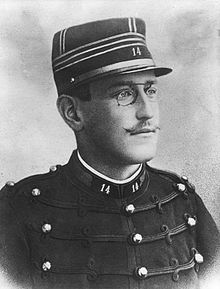Our website is made possible by displaying online advertisements to our visitors.
Please consider supporting us by disabling your ad blocker.
Alfred Dreyfus
You can help expand this article with text translated from the corresponding article in French. Click [show] for important translation instructions.
|
Alfred Dreyfus | |
|---|---|
 Dreyfus c. 1894 | |
| Personal details | |
| Born | 9 October 1859[1] Mulhouse, French Empire |
| Died | 12 July 1935 (aged 75) Paris, French Republic |
| Resting place | Montparnasse Cemetery, Paris 48°50′17″N 2°19′37″E / 48.83806°N 2.32694°E |
| Nationality | French[1] |
| Spouse | |
| Children | Pierre Dreyfus Jeanne Dreyfus Levy |
| Parents |
|
| Alma mater | École Polytechnique École Supérieure de Guerre |
| Signature | |
| Military service | |
| Allegiance | |
| Branch/service | French Army |
| Years of service | 1880–1918 |
| Rank | |
| Unit |
|
| Battles/wars | |
Alfred Dreyfus (French: [alfʁɛd dʁɛfys], German: [ˈalfʁeːt ˈdʁaɪfuːs]; 9 October 1859 – 12 July 1935) was a French artillery officer of Alsatian origin and Jewish ethnicity and faith. In 1894, he fell victim to a judicial conspiracy that sparked a major political crisis during the Third Republic, known as the Dreyfus Affair (1894–1906), when he was wrongfully accused and convicted, due to antisemitism, of being a spy for the German Empire. Upon his arrest, he was sentenced to degradation and deported to the penal colony on Devil's Island to be imprisoned until his death. However, evidence emerged showing that Dreyfus was innocent and that the true culprit was a Catholic officer named Esterhazy. Gradual revelations indicated that the internal investigation conducted by the army was biased; Dreyfus was an ideal scapegoat because he was Jewish, and the army's high command was aware of his innocence but preferred to cover up the affair and leave him in the penal colony rather than lose face.
The scandal erupted, shaking French political life; it highlighted the connections between the French army and the political circles of the time with antisemitism. After numerous judicial and political twists, the publication of Émile Zola's manifesto, J'accuse... !, in 1898 brought new momentum to Dreyfus's cause. Zola accused the army and French political leaders of covering up the affair. Dreyfus was eventually exonerated, rehabilitated, and reinstated in the French army, although at a lower rank than his seniority would have warranted.
The anti-Dreyfusard and antisemitic factions, however, viewed this rehabilitation unfavorably, and while attending the transfer of Émile Zola's remains to the Panthéon, Dreyfus was targeted in an attack by an antisemitic militarist activist, who was later acquitted in trial, but Dreyfus survived.
He fought in World War I, notably at Verdun and the Chemin des Dames, then retired and led a quiet life. He died in 1935 in Paris and was buried in the Montparnasse Cemetery.
Alfred Dreyfus's life and the persecutions he endured because he was Jewish left a significant mark on French political consciousness; the true culprit, Ferdinand Walsin Esterhazy, remained unpunished. Among Dreyfus’s defenders were writers such as Émile Zola, Charles Péguy, and Anatole France, politicians like Georges Clemenceau and Jean Jaurès, and the founders of the Human Rights League (LDH) Francis de Pressensé and Pierre Quillard.
- ^ a b "Birth certificate of Dreyfus, Alfred". culture.gouv.fr. Government of the French Republic. Archived from the original on 24 July 2019. Retrieved 24 July 2019.
Previous Page Next Page


